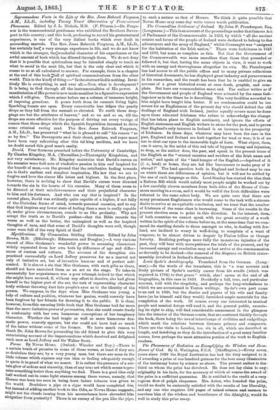The Cromwellian Settlement of Ireland. By John P. Prendergast, Esq.
(Longmans.)—This is an account of the proceedings under that famous Act of Parliament of the Commonwealth in 1653, by which "all the ancient estates and farms of the people of Ireland were declared to belong to the adventurers and the army of England," whilst Connaught was "assigned for the habitation of the Irish nation." There were forfeitures in 1641 . and 1688, but none so complete as this. Not that the Government of the Commonwealth was more merciless than those that preceded or followed it, but that, having the same objects in view, it went to work with an energy and thoroughness altogether its own. Mr. Prendergast has had access to all the public offices and to many private collections of historical doonments, he has displayed great industry and perseverance in his researches, and the result has been that he is enabled to give an account of a great historical event at once freak, graphic, and com- plete. But here our commendation mast end. The author writes as if the Government and people of England were actuated by the same feel- ings now as in the times he is describing. The very facilities accorded to him might have taught him better. If no condemnation could be too- severe for an Englishman of the present day who should defend the old dealings of England with Ireland, justice equally severe must be done upon those educated Irishmen who refuse to acknowledge the change that has taken place in English sentiment, and ignore the efforts of English statesmen and English writers to atone for the past, and to prove that England's only interest in Ireland is an increase in the prosperity of Irishmen. In these days, whatever may have been the case in the past, England and Ireland are knit together for weal or woe; it is of no use to shut our eyes to the inexorable logic of facts. What object, then, can it serve, in the midst of this sad tale of bygone wrong and injustice, to drop, as the author does, the past, and speak in the present tense of the English as the " eternal enemies and revilers of the Irish name and nation," and again of the " land hunger of the English;—deprived of it (i. e., land) at home, they are led like buccaneers to make prey of it abroad ?" The land question both in England and Ireland may be one on which there are differences of opinion, but it will not be settled by the use of such language as this. Lord Stanley has started the idea that a Reform Bill which would satisfy most people might be worked out by a few carefully chosen members from both sides of the House of Com- mons meeting in a room, and it would be well if the Irish difficulties were referred to the same select body. We are quite sure that there are many prominent Englishmen who would come to the task with a sincere. desire to arrive at an equitable conclusion, and we trust that the number of Irishmen of the same class is increasing. Some of the results in the. present election seem to point in this direction. In the interest, then,...: of both countries we cannot speak with too groat severity of a work written in the spirit of the volume before us, at the same time that wo com- mend its startling details to those amongst ns who, in dealing with Ire- land, are inclined to weary in well-doing, to complain of a want of response, to be almost driven to despair by Fenian follies or Orange ferocity. Realizing perhaps more fully the monstrous injustice of the past, they will bear with more patience the trials of the present, and by- increased energy and resolution may at last arrive at the consummation, so devoutly to be desired—the removal of the disgrace on British states- manship involved in Ireland's discontent.






























 Previous page
Previous page